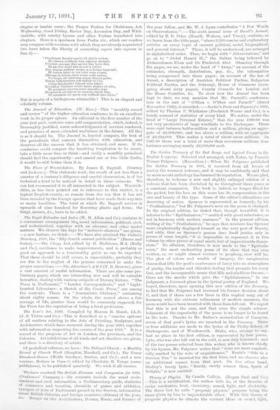The Golden Treasury of the Best Songs and Lyrical Poems
in the English Language. Selected and arranged, with Notes, by Francis Turner Palgrave. (Macmillan.)—When Mr. Pal grave published his Golden Treasury in 1801, it received from all lovers of poetry the warmest welcome, and it may be confidently said that no more recent anthology has lessened its reputation. We are glad, therefore, to welcome a now and slightly enlarged edition of a volume that has been cherished by us throughout these years as a constant companion. The book is, indeed, no longer fitted for the pocket, but the loss on this score has its compensation in the size and beauty of the type. Some of the editor's alterations are deserving of notice. Spenser is represented, as formerly, by his " Prothalamion," but Mr. Palgrave's note on the poem is changed. In the original edition, he stated that, though beautiful, it is inferior to the " Epithalamion," " omitted with great reluctance, as not in harmony with modern manners." In the present edition, writing of the " Prothalamion," he says that nowhere has Sponsor more emphatically displayed himself as the very poet of Beauty, and adds, that as Spenser's genius does itself justice only in poems of some length, "it is impossible to represent it in this volume by other pieces of equal merit, but of impracticable dimen- sions." No allusion, therefore, is now made to the " Epithala- mien," the most enchanting poem of its class that was ever written, or, we might almost venture to prophesy, ever will be. The glow of colour and wealth of imagery, the imaginative charm that lifts the poet's exuberance of fancy into an atmosphere of purity, the tender and chivalric feeling that prompts his every lino, and the incomparable music that fills and gladdens the ear,— these are the merits which give the " Epithalamion," in our judgment, a foremost place in the lyrical poetry of England. We hoped, therefore, upon opening this new edition of the Treasury, to find that Mr. Palgrave had reversed his former decision about it, and that if there are a few lines in this nuptial song out of harmony with the extreme refinement of modern manners, the poem would have been inserted with those lines left out. We regret that this is not the case, and that even the simple acknow- ledgment of the superiority of the poem is no longer to bo found in the note. Thanks to Mr. Billion's resuscitation of Campion, seven of that poet's lyrics are inserted in the Treasury. Three or four additions are made to the lyrics of Sir Philip Sidney, of Shakespeare, and of Wordsworth. Blake, who, strange to- say, had no place in the first edition, is represented by four poems. Lyte, who was also left out in the cold, is now duly honoured ; and of the two poems selected from this writer, who is known chiefly by his hymns, Mr. Palgrave writes that "none are more emphati- cally marked by the note of exquisiteness." Keats's " Ode to a Grecian Urn" is inserted for the first time, and we observe also an additional sonnet from that poet. On the other hand, Shelley's lovely lyric, " Rarely, rarely comest thou, Spirit of Delight," is now omitted.






































 Previous page
Previous page